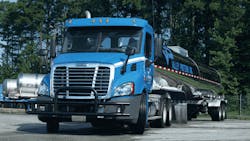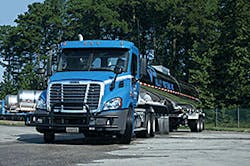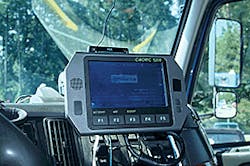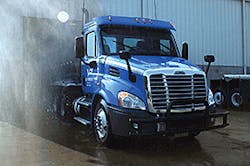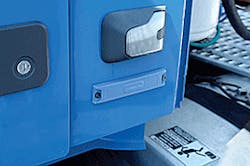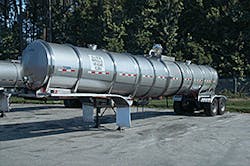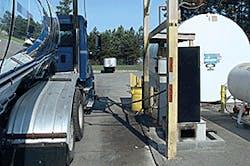Tank fleet helps Valley Proteins excel as supplier of high-protein feed ingredients
FOR MORE than 60 years, Valley Proteins Inc has specialized in the collection and recycling of inedible animal byproducts from the food industry. These byproducts are turned into high-energy feed fat and protein-rich meal products for feed producers and biodiesel feedstock.
The Winchester, Virginia-based company collects more than three billion pounds a year of waste products (including waste cooking oils and meat/poultry byproducts) from restaurants, supermarkets, abattoirs, and poultry processing facilities throughout the Mid-Atlantic, eastern, and southwestern United States. Processing is handled at 22 Valley Proteins facilities, 12 of which have state-of-the-art continuous rendering systems.
Operations are supported by a large private fleet of heavy-duty vehicles that includes 480 tractors and 236 tank trailers. Roughly 600 truck drivers keep much of the fleet running 24/7.
“Valley Proteins has built a reputation for providing customers with a high level of service, and our in-house truck fleet is critical to that effort,” says Paul Battista, Valley Proteins project manager. Our customers know they can rely on us to provide prompt and efficient collection and recycling services directly tailored to their needs. Valley Proteins is equipped with one of the largest truck and transport vehicle fleets in the industry, specifically designed for the rigors of transporting restaurant grease and inedible by-products. And, with our safe, sanitary handling practices, customers can count on us to properly remove their waste materials.
“While our focus is on the United States, we also serve a growing international market. Valley Proteins is one of the largest US exporters of competitively-priced poultry-based animal proteins. Through exporting facilities located in Wilmington, North Carolina; Savannah, Georgia; and Charleston, South Carolina, we have the capabilities to supply all areas of the world with 58% protein poultry by-product meal, 62% protein pet food grade poultry by-product meal, 80% protein feather meal and animal protein blends. Our valued-added, poultry-based animal proteins have been proven to be one of the most economical and effective feed ingredients available to global feed producers today. In addition, Valley Proteins is a major exporter of quality yellow grease and poultry fats to global feed producers from a major exporting facility in Norfolk, Virginia.”
The company fleet handles all of the in-bound movements of raw product and a sizable percentage of the processed product outbound shipments. The company also uses for hire carriers and railcars for outbound shipments to customers across the United States. Twenty-foot ISO box containers are used for overseas shipments of high-protein meal.
The number of company trucks ranges from a maximum of 68 at the Fayetteville, North Carolina, processing facility to a minimum of four at the smallest locations. Each fleet location has its own load control center that coordinates all transportation activity out of that location.
“We make the arrangements for all of the Valley Proteins shipments whether they will be hauled by our own fleet or a for-hire carrier,” says Greg May, Valley Proteins truckload logistics manager at the Fayetteville facility. “Our load control centers take a macro view of the transport operation, coordinating front hauls and backhauls. We want to keep our equipment moving continuously to ensure full utilization.”
On the in-bound side, the company fleet handles two distinct sectors—large processors that can generate more than a trailer load a day and smaller operations (grocery stores, small slaughter houses, and restaurants) that generate only a few hundred gallons at a time. Valley Proteins vehicles typically operate within 250 miles of their assigned plant location.
“We’ll use tanks or open-top trailers for the large meat and poultry processors,” Battista says. “Drivers average three loads a shift serving these customers. For the smaller processors, we run what is essentially a route pick-up operation that keeps a driver out for his entire shift. We slipseat tractors wherever possible to ensure maximum productivity.”
Support drivers
To further enhance productivity and meet client needs, the company recently established a team of support drivers at the Fayetteville location. These drivers can move around through the Valley Proteins system to help address driver shortages and changes in plant operations.
“We have eight drivers in that group now, and we plan to add a couple more,” May says. “The primary for the team is on the Carolinas at this time. The drivers spend a week wherever they are needed, and then they are back in Fayetteville for a week.”
Technology also helps maximize productivity and efficiency. Several years ago, Valley Proteins rolled out Cadec’s PowerVue system across the entire fleet. Battista explains that the company needed a fleet management system that could accommodate last-minute pickup requests from customers (a frequent occurrence). In addition, the company needed a system that could be configured to its specific needs, so drivers would be presented with a workflow tailored to each type of pickup or delivery. Picking up used restaurant cooking oils for recycling, for instance, requires collecting different data than does delivering pet feed or biofuel.
“In our business, time is money and we needed the ability to make last minute changes to our fleet operations if needed,” Battista says. “A restaurant that needs a grease pickup can’t wait three days. If we can’t come today, they are going to call someone else.”
SaaS technology
Battista and his team determined that the Cadec product fit the bill. A flexible SaaS (Software as a Service)-based fleet management solution, PowerVue provides all the best-in-class, advanced fleet management features in a single, easy-to-use, secure and reliable SaaS platform with innovative in-cab hardware designed specifically for the enterprise-class customer.
“Using PowerVue and the Cadec onboard computer opened up so many possibilities for us in terms of extending our supply chain management efforts right into our trucks,” Battista says. “PowerVue is beautifully architected for companies like Valley Proteins that want to link together several different tools to create a tailored transportation management solution. We’re able to plan and optimize routes based on orders from our planning system, and have those routes be displayed as maps with turn-by-turn directions to the driver. PowerVue then tracks the driver’s progress, sending back real-time data including planned-versus-actual results for all pickup and delivery activities.”
With real-time visibility into fleet operations, Valley Proteins fleet managers can now determine which vehicle with capacity is closest, schedule a pickup time on the spot, and update the driver’s route over the air. Service reps can give customers more accurate info on exact delivery/pickup times, including automatic updates if a truck is delayed due to traffic or for other reasons.
The company is able to manage planned versus actual performance and drill down into factors that may be negatively impacting efficiency. “For instance, we could see that deliveries to certain areas were consistently delayed by traffic,” says Battista. “Using that data, we were able to adjust our routes to avoid that situation.”
Cadec and PowerVue provide electronic driver log capabilities, and enable Valley Proteins to measure both driver and fleet behavior, such as idling and sudden decelerations; to improve safety; and save fuel through its Performance Management Scorecards. Valley Proteins is planning to implement Cadec’s eDVIR solution, which enables drivers to complete paperless inspection reports that are compliant with Federal Motor Carrier Safety Administration regulations; and SpeedTracker, which provides speed-by-road segment data to track driver behavior against established speed limits.
Battista emphasizes that ease of driver use was critical. “If the system was too complicated, we knew our drivers wouldn’t use it,” he says. “PowerVue prompts drivers through their day with a workflow designed for their vehicle and each type of delivery or pickup, and any changes are handled via the Cadec unit. No more sticky notes in the cab and no need for a driver to use his or her mobile phone.”
Cadec and PowerVue get plenty of attention during new-driver training. Most of the drivers hired by Valley Proteins have at least one year of truck driving experience, but the company also have begun accepting graduates of accredited driving schools who have as little as six months of driving experience.
Developed in-house, the driver training is done at each Valley Proteins location where trucks are based and is part of an overall training program that lasts two to eight weeks. The training is tailored to the specific business activity at each location.
New hires receive a thorough orientation on the fleet, which includes Freightliner and Volvo tractors. All are daycabs.
Non-code uninsulated stainless steel tank trailers are used to transport meat and poultry byproducts to the Valley Proteins processing plants, and non-code insulated stainless steel trailers are used for out-bound shipments of finished products. Typical capacity is 6,500 gallons for the uninsulated tankers and 7,000 gallons for the insulated tanks. Tank trailer suppliers include Heil Trailer International and Polar Tank Trailer Inc.
Non-code aluminum vacuum trailers with a 6,500-gallon capacity are used to collect used cooking oil and grease trap wastes from restaurants and other clients.
Valley Proteins specifies Muncie PTOs and hydraulic wet kits on tractors to run trailer-mounted Roper product pumps and Challenger vacuum pumps. Mechanics install the hydraulics system hardware in-house at company maintenance shops.
For newer tank trailers in the fleet, the company has specified running gear that includes widebase single tires and Hendrickson Intraax air suspension/axle systems with Tiremaax automatic inflation.
About 90% of the maintenance for the tractors and trailers (other than warranty work) is handled in-house. Preventive maintenance for tractors includes an engine oil and filter change at 15,000-mile intervals. Trailers are serviced on a 90-day schedule.
Cleanliness is important for the Valley Proteins operation. The plants have wash systems for internal tank cleaning after every load. Some of the maintenance shops also have driver-through wash systems for exterior cleaning of tractor-trailer rigs. ♦
About the Author
Charles Wilson
Charles E. Wilson spent 31 years covering the tank truck, tank container, and storage terminal industries throughout North, South, and Central America as the editor of Bulk Transporter. Prior to 1989, Wilson was managing editor of Bulk Transporter and Refrigerated Transporter and associate editor of Trailer/Body Builders. Before joining the three publications in Houston TX, he wrote for various food industry trade publications in other parts of the country. Wilson has a bachelor's degree in journalism from the University of Kansas and served three years in the U.S. Army.
